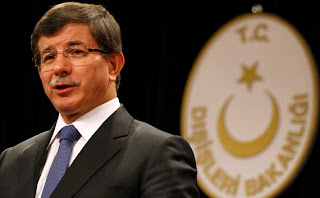Sebnem ARSU The New York Times
ISTANBUL — Turkish officials continued Tuesday to step up pressure on Syria, saying they would consider having their military cross the border to impose a safety zone if the Assad government failed to stop killing citizens demanding democratic change.
Foreign Minister Ahmet Davutoglu said Tuesday that his government was hopeful that an incursion would be unnecessary and that Syria would respond to sanctions imposed Sunday by the Arab League. But the Syrian government has shown no willingness to abide by its neighbors’ demands, declaring the Arab League move “economic war.”
In a television interview broadcast on Kanal 24, a private network, Mr. Davutoglu said, “Despite all, if oppression continued, Turkey remains ready for all possible scenarios,” including creating a buffer zone. He said it would be established in coordination with the international community to offer large groups of Syrians protection from violence along borders with Jordan, Lebanon, Iraq and Turkey.
“If further oppression gives way to a major human movement, tens of thousands of people leave their homes and move towards borders with not only Turkey but also Jordan, Lebanon and Iraq, there would be a huge stress on these neighboring countries,” Mr. Davutoglu said. “We never wish people to leave their bases, homes, but we also have to consider such a scenario and work accordingly.”
Turkey was once one of Syria’s closest regional allies, and the prime minister, Recep Tayyip Erdogan, was once close to the Syrian president, Bashar al-Assad. But as the political crisis has churned in Syria for months, with government forces killing at least 3,500 demonstrators, according to the United Nations, Turkey has severed its ties, called on Mr. Assad to step down and threatened ever-increasing pressures if the killing does not stop.
Mr. Erdogan’s Justice and Development Party strongly opposes international military intervention in Syria and still urges a political resolution to end the conflict, yet has taken an increasingly hard line. Turkey hosts the Syrian military defectors who are organizing an increasingly aggressive, if not yet effective, insurgency inside Syria. It is offering safe haven to more than 7,500 Syrian citizens in tent camps in Hatay, a southern town neighboring Turkey’s 500-mile border with Syria.
Turkey also decided, given that Mr. Assad continues to ignore Arab League calls for peace and political reform, to divert all of its Middle Eastern trade away from routes that traverse Syria, siphoning off yet another source of income for Syria and severing yet another global tie for an increasingly isolated government.
“Transportations via Iraq, en route to Jordan, Saudi Arabia, Yemen and the gulf will be further supported, and we’ll step up studies over this route,” Binali Yildirim, the transportation minister, said Tuesday in a televised statement.
Limitations on transportation, however, would not apply to the delivery of basic food and medical supplies to the Syrian population, while border controls would be intensified to prevent arms trade, the minister added.
Flights between Damascus, the Syrian capital, and Turkish towns continued as scheduled.
On Sunday, the Arab League imposed unprecedented sanctions on one of its own, having suspended Syria from the group and issuing a travel ban against scores of senior Syrian officials, a freeze on government assets in Arab countries, a ban on transactions with Syria’s central bank and an end to all commercial exchanges with the government.
Turkish frustration with Syria increased a day earlier when an independent commission organized by the United Nations Human Rights Council released a report that documented what it described as “patterns of summary execution, arbitrary arrest, enforced disappearance, torture, including sexual violence, as well as violations of children’s rights.”
The commission expressed concerns that “crimes against humanity have been committed.”
Syria has rejected any assertions that its military was responsible for civilian bloodshed, saying both the West and the Arab world refused to accept the Assad government’s view that Syria has been the target of armed gangs financed from abroad.

Hiç yorum yok:
Yorum Gönder